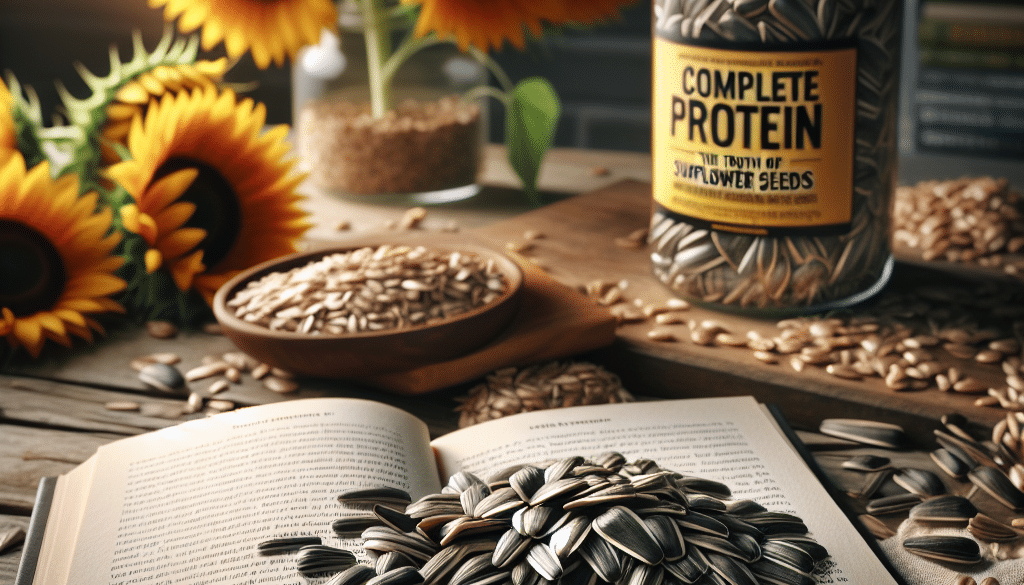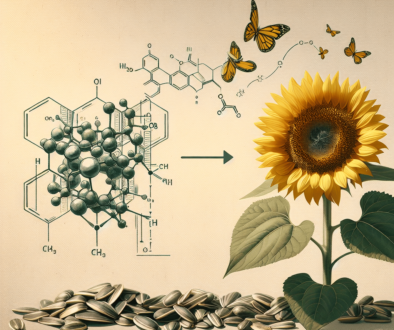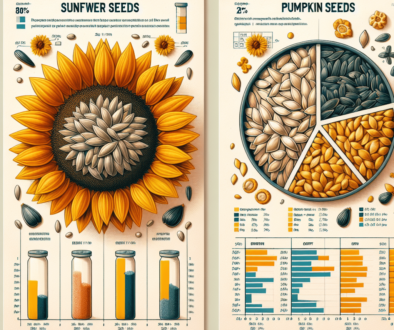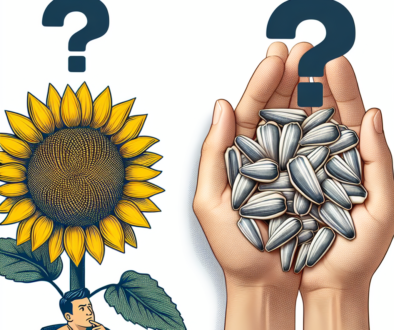Complete Protein? The Truth About Sunflower Seeds
-
Table of Contents
- Sunflower Seeds: Unveiling the Complete Protein Myth
- Understanding Protein Completeness
- The Amino Acid Profile of Sunflower Seeds
- Nutritional Benefits of Sunflower Seeds
- Integrating Sunflower Seeds into a Balanced Diet
- Case Studies and Research on Protein Quality
- Comparing Sunflower Seeds to Other Protein Sources
- Statistics on Protein Consumption and Plant-Based Trends
- Conclusion: The Role of Sunflower Seeds in Protein Nutrition
- Discover ETprotein’s Sunflower Seed Protein Products
Sunflower Seeds: Unveiling the Complete Protein Myth
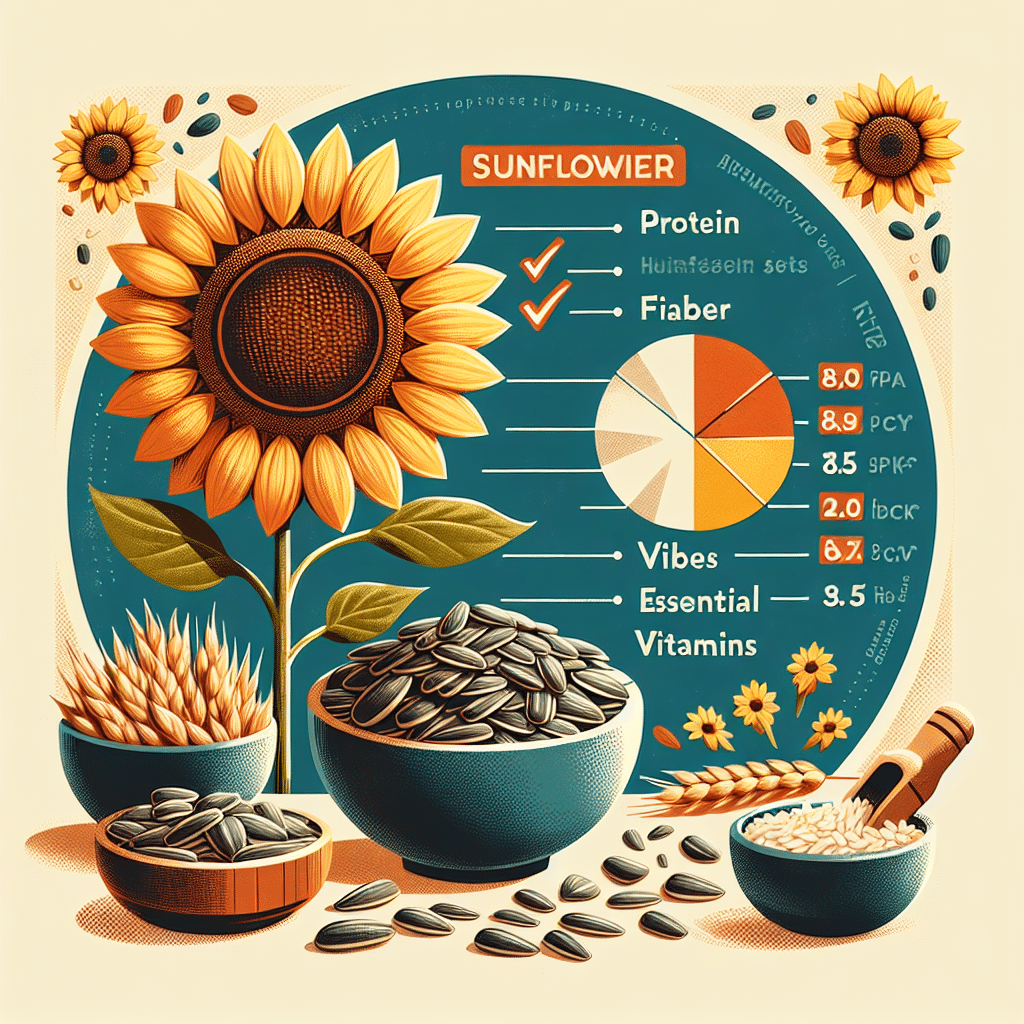
When it comes to plant-based nutrition, protein is often a hot topic of discussion. Among the myriad of seeds, nuts, and legumes touted for their protein content, sunflower seeds have emerged as a popular snack and ingredient. But are they a complete protein source? This article delves into the truth about sunflower seeds and their protein profile, backed by scientific research and expert insights.
Understanding Protein Completeness
Before we examine sunflower seeds specifically, it’s crucial to understand what constitutes a “complete” protein. Proteins are made up of amino acids, which are the building blocks of our muscles, enzymes, and hormones. There are 20 different amino acids, and nine of these are considered essential because our bodies cannot produce them. A complete protein contains all nine essential amino acids in sufficient quantities.
The Amino Acid Profile of Sunflower Seeds
Sunflower seeds are the fruits of the sunflower plant, known scientifically as Helianthus annuus. They are rich in nutrients, including healthy fats, vitamins, minerals, and, of course, protein. But how does their amino acid profile stack up?
- Essential Amino Acids: Sunflower seeds contain all nine essential amino acids, but some in lower amounts than others.
- Lysine: This is the limiting amino acid in sunflower seeds, meaning it is present in lower amounts compared to other essential amino acids.
- Methionine and Cysteine: Sunflower seeds are relatively high in these sulfur-containing amino acids.
While sunflower seeds have all the essential amino acids, the lower levels of lysine mean they are not considered a complete protein when consumed alone.
Nutritional Benefits of Sunflower Seeds
Despite the incomplete protein profile, sunflower seeds are a nutritional powerhouse. They offer a range of health benefits that make them a valuable addition to any diet.
- Heart Health: Rich in unsaturated fats, sunflower seeds can help reduce cholesterol levels and lower the risk of heart disease.
- Antioxidant Properties: They contain vitamin E and selenium, which are potent antioxidants that protect cells from damage.
- Mineral-Rich: Sunflower seeds are a good source of magnesium, zinc, and iron, which are essential for various bodily functions.
Integrating Sunflower Seeds into a Balanced Diet
To make the most of sunflower seeds’ nutritional profile, it’s important to integrate them into a balanced diet that includes other protein sources. Here are some ways to do that:
- Pairing with Legumes: Combine sunflower seeds with legumes like beans or lentils to create a meal with a more complete amino acid profile.
- Adding to Salads: Sprinkle sunflower seeds on salads for added texture and nutrients.
- Using as a Snack: Enjoy a handful of sunflower seeds as a part of a healthy snack mix.
Case Studies and Research on Protein Quality
Several studies have examined the protein quality of various seeds and plant-based foods. For instance, research published in the Journal of Agriculture and Food Chemistry analyzed the protein digestibility-corrected amino acid score (PDCAAS) of different seeds, including sunflower seeds. The PDCAAS is a method of evaluating the protein quality based on both the amino acid requirements of humans and their ability to digest it.
While sunflower seeds did not achieve a score as high as soy or whey protein, they still offered a respectable amount of bioavailable protein. This suggests that when combined with other protein sources, sunflower seeds can contribute to meeting dietary protein needs.
Comparing Sunflower Seeds to Other Protein Sources
When compared to other plant-based protein sources, sunflower seeds hold their own. Here’s how they stack up:
- Legumes: Beans and lentils typically have more protein per serving and a better balance of essential amino acids.
- Nuts: Similar to sunflower seeds, nuts like almonds and walnuts offer a good amount of protein along with healthy fats.
- Whole Grains: Grains like quinoa and buckwheat are complete proteins and can complement the amino acid profile of sunflower seeds.
Statistics on Protein Consumption and Plant-Based Trends
With the rise of plant-based diets, the demand for alternative protein sources has surged. According to a report by MarketsandMarkets, the global plant-based protein market is projected to grow from USD 10.3 billion in 2020 to USD 14.5 billion by 2025. This growth is driven by increasing health consciousness, dietary restrictions, and environmental concerns.
Sunflower seeds, as part of this trend, are gaining popularity not only as a snack but also as a versatile ingredient in plant-based protein powders and meat alternatives.
Conclusion: The Role of Sunflower Seeds in Protein Nutrition
In conclusion, while sunflower seeds are not a complete protein on their own, they are a nutritious addition to a varied diet. Their rich content of vitamins, minerals, and healthy fats, along with their protein contribution, make them a valuable food for health-conscious individuals. By combining sunflower seeds with other protein sources, one can ensure a balanced intake of essential amino acids.
Discover ETprotein’s Sunflower Seed Protein Products
If you’re looking to incorporate sunflower seed protein into your diet, ETprotein offers a range of high-quality protein products. Their sunflower seed protein is characterized by a neutral taste, non-GMO, and allergen-free attributes, making it an excellent choice for various applications.
Whether you’re a manufacturer looking to create plant-based protein blends or an individual seeking to enhance your diet, ETprotein’s offerings can meet your needs. Explore their sunflower seed protein and other plant-based proteins to find the perfect fit for your nutritional goals.
About ETprotein:
ETprotein, a reputable protein Chinese factory manufacturer and supplier, is renowned for producing, stocking, exporting, and delivering the highest quality organic bulk vegan protein and plant proteins. They include Organic rice protein, clear rice protein, pea protein, clear pea protein, pumpkin seed protein, sunflower seed protein, mung bean protein, etc. Their offerings, characterized by a neutral taste, non-GMO, allergen-free attributes, cater to a diverse range of industries. They serve nutraceutical, pharmaceutical, cosmeceutical, veterinary, as well as food and beverage finished product distributors, traders, and manufacturers across Europe, USA, Canada, Australia, Thailand, Japan, Korea, Brazil, and Chile, among others.
ETprotein specialization includes exporting and delivering tailor-made protein powder and finished nutritional supplements. Their extensive product range covers sectors like Food and Beverage, Sports Nutrition, Weight Management, Dietary Supplements, Health and Wellness Products, and Infant Formula, ensuring comprehensive solutions to meet all your protein needs.
As a trusted company by leading global food and beverage brands and Fortune 500 companies, ETprotein reinforces China’s reputation in the global arena. For more information or to sample their products, please contact them and email sales(at)ETprotein.com today.

